The Cinematic Redemption of Amy March
 Wednesday, January 29, 2020 at 3:00PM
Wednesday, January 29, 2020 at 3:00PM 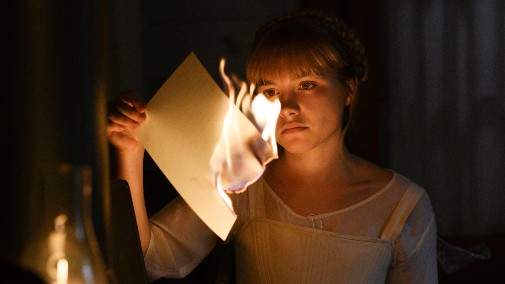
Greta Gerwig's Little Women is a bold adaptation of Louisa May Alcott's beloved classic in more ways than one. Structurally, it shatters the novel's chronology, making past and present, childhood and adulthood, talk to each other in a dialogue of echoes and rhymes. For instance, when Jo loses a sister in the wintery coldness of the present, Gerwig marries the moment to the memory of another kind of sisterly loss, when a wedding in warm colors was a harbinger of future loneliness for the heroine. Another element that makes this new adaptation so radically different from the previous ones is its treatment of Jo's sisters. No longer are Meg, Beth, and Amy March relegated to the periphery of the text. This 19th-century classic is called Little Women, after all, not Little Woman.
When it comes to its portrayal of Amy, the novel's most condemned character, the 2019 film is of particular innovation. We could almost say this Little Women redeems Amy March after centuries of villainizing her…
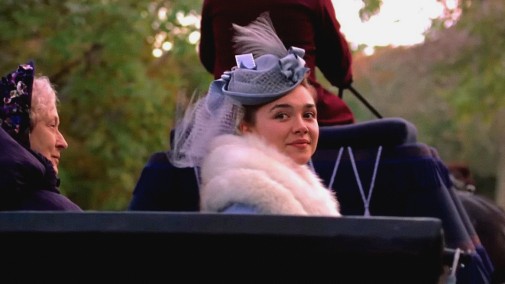
We first meet Amy in Paris, as she promenades through public gardens with her elderly Aunt. Bedecked in fuzzy furs, blue silks, and veiled millinery, she's a vision of plush Victorian wealth and a debutante's elegance. Her behavior, however, isn't as lady-like as all that. As soon as she sees Timothée Chalamet's Laurie on the street, the mask of a well-behaved society ornament is shed and we appreciate the spectacle of her exuberant personality. In one scene, Gerwig and actress Florence Pugh have introduced us to Amy's main characteristics as well as her more troubling contradictions.
Amy's a pragmatic young woman who knows how to please her elderly relative and thrives within a social environment built out of patriarchal prejudice and forced female submission. She plays the game instead of defying it like her rebellious older sister Jo. Still, Amy knows what she wants and the glint of childlike romanticism isn't completely drained from her eyes. Laurie makes the facade of the society lady unravel and we see the girlish wonder of the March's youngest daughter. She's effusive and ebullient, loud and even silly in her charming petulance. At least, it's charming when filtered through the innate charisma and star power of Florence Pugh.
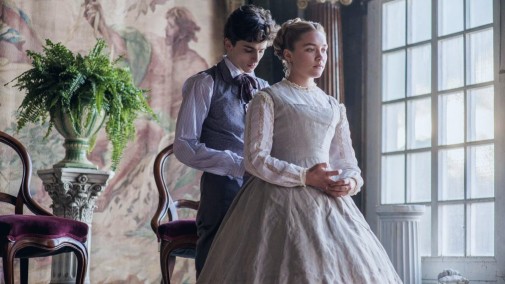
The introductory scene presents aspects of the character never again seen in such contrasting communion. The petulant dreamy romantic of a spoiled childhood mostly lives in the scenes of gold-tinted youth while the ambitious lady is reserved for the European present. However, the way one grew into the other is never regarded as inorganic or hard to believe. Part of the trick is how the role isn't divided by two actresses as is the custom; Pugh plays both the 12-year-old Amy and her adult counterpart, relying on body language and other actorly mechanisms to sell it. Some anachronistic clip-on bangs also help.
Another important thing to consider is how Gerwig gives context to Amy's choices. As a novel, Little Women is a bit limited by the perspective of its protagonist, which is hardly surprising when one considers how much Louisa May Alcott put herself into the character of Jo. However, this tends to make the other sisters more difficult to understand or view as tridimensional personalities. In this too, the 2019 adaptation bucks convention and paves its own way, using Alcott's other writing as a way to flesh out the novel's subtler themes and underwritten characters. No one benefits from this more than Amy.
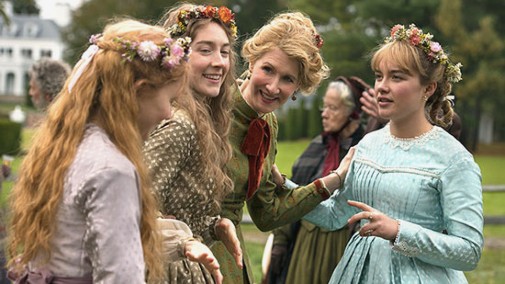
Her perceived faults of vanity and a desire for nice things are made understandable byproducts of an artist's love for beauty. Similarly, her more brattish behavior is regarded as flights of youth easily outgrown by the advent of maturity. Yes, she still burns Jo's adolescent manuscript but that action doesn't need to be seen as an unforgivable sin. Perhaps more crucially, her love affair with Laurie doesn't come out of nowhere, being heavily foreshadowed by hilarious pops of infantile infatuation that flower into genuine romantic affection. And while Amy may view marriage as an economic proposition, that doesn't signal a mercenary's heart but the uncompromising nature of a woman who knowingly lives within a system that sees her as subordinate to men.
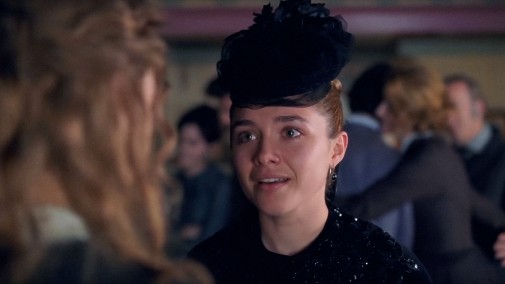
I confess to disliking Amy when I first read Little Women many years ago. As I grow older, however, I feel more and more affection towards this silly kid who grew into a confident woman. Gerwig's take on the character only solidifies my love of Amy March, Little Women's most underappreciated character.



Reader Comments (19)
I like her, I’m happy for her Oscar nom (my vote among the nominees would be for her, even if Dern deserves her glory) and I wish Plugh the very best, but after Lopez’s snub this category became definitely uninteresting at least for me
Nice writeup, but there's one point here that I disagree with. Hard as she's trying, Pugh never sold me on her 12-year-old version of Amy. It's not her fault, it's just that the conceit of a woman who is approaching her mid-20's playing a child is impossible to take seriously, and it looks really silly in a film that is striving for sincerity and earnestness (at points I even forgot she was supposed to be a child during those scenes). I still love Florence Pugh's performance (particularly that first scene you described so lovingly), but this was a miscalculation on Greta Gerwig's part that Florence is doing the best she can with... the other miscalculation is she's acting alongside actresses who, while older than her, have such childlike faces, and that makes it hard to buy that she's the youngest (it doesn't help that we've been watching Emma Watson and Saoirse Ronan grow up on screen)...
That was a character that was indeed polarizing but man, Florence Pugh made me love that character. She knocked it out of the park.
Love Florence Pugh, she's a terrific actress, lovely in Little Women and entrancing in Midsommar. Nice write up!
I love Little Women, but it's always been, Meg=boring, Beth=sweet, Amy=jerk, Jo=lead singer.
This movie does so much for Amy and Beth, I loved them so much.
Meg is still boring though.
Meg needed a more intuitive less surface actress.
The new structure in flashbacks only benefits her character. It's a flawless performance and she would totally get my vote if she weren't that young.
I like Emma Watson in certain roles, but knowing Emma Stone was supposed to be Meg makes so much more sense for the character as written.
Anyway, Florence Pugh is a star, and she gives Amy this anachronistically punk sensibility that I absolutely adore. She’s easily my pick in her category.
I'm a detractor. I really found Pugh's portrayal of my to be insufferable. A lot of it has to do with the unlikability of the character. But she was definitely my absolute least favourite part - if you take Meryl out of the film.
Something about the implausibility of her portrayal of the younger Amy charmed me. I love how she leaned into her brattiness and charted the character's growth overall. I know she's about to be a Marvel star, but I hope she continues to make interesting choices outside of that.
Sorry - I thought her performance as the 12-year-old was painted with the BROADEST of strokes and embarrassing. She was better as an adult, but the kid stuff bordered on parody so much it brought the whole performance down. It genuinely reminded me of the French and Saunders Harry Potter skit where they were playing the kids.
It's a shame but I don't really think it is Pugh's fault. Pugh is a terrific actress, and I am positive she will go on to great things. Her performance in Lady Macbeth was one of the five best that year for sure.
Regarding the critique of Pugh being unable to convince as a 12-year-old, I confess that wasn't a problem for me. However, one of my favorite performances ever is Joan Fontaine in Letter from an Unknown Woman so the matter of an adult actor playing a child isn't something that I find terribly off-putting. It's very Old Hollywood.
Also, I always thought that one of the reasons the 1994 adaptation fails Amy so much is because of its separation of the role into two actresses. We spend all the childhood scenes getting attached to Dunst's take on the character. Then, when Amy gains agency and has to be the lead of her storyline, we have Samantha Mathis for which the audience as no connection. It's jarring and jeopardizes the emotional arc of the narrative.
Still, I understand why some wouldn't like this approach and find it too broad and cartoonish. I appreciate all the feedback. Thank you all.
@Cláudio: Here's the issue though: Old Hollywood was more theatrical. The way films were made back then, shot in black-and-white and with broader performances, it created that necessary distance between the viewer and the material to buy things like an older actor playing a child. The way Hollywood has evolved, I don't think you can get away with that now, at least not without resorting to CGI (which, this being Nathaniel's site, I dare not suggest, lol). Film is a more literal medium now, and given the more earnest and modern tone that Greta Gerwig is presenting in her film, a conceit like that feels entirely out of tone with the way it presents everything else, including the character of Amy.
Also, given the way Greta structured the film, it makes even more sense to have two actresses play Amy. Since we're constantly jumping from one time period to the other, we'd get plenty of time to make a connection with both actresses playing Amy and Greta could have used several editing tricks to make sure we never lose the thread that they're the same person (and would have even given us one more thing to ground us on which time period we're in at any given time).
And while you may be right about the 1994 adaptation failing Amy, I also think a lot of that has to do with how dull Samantha Mathis was in the role, especially compared to Kiki Dunst's liveliness.
Burning anyone's manuscript is an unforgettable sin says the book of Misery.
Richter Scale -- You make good points. However, while I may understand where you're coming from, I respectfully disagree.
Cinema may have moved towards a more literal sensibility, where naturalism is the standard by which we decide if an actor's work is good or not, but not every picture necessarily follows this trend. I'd argue Gerwig's movie is more stylized than the 1994 one, for instance, closer to the way the 1949 Little Women adapted its style and text to that era's preoccupations and aesthetics.
If I were to judge 2019's Little Women as an attempt at a naturalistic take on the novel, then I'd have to deem it a resounding failure. The film has a ton of stylization going on, from the modernized 19th-century fashions to the anachronistic hair, jarringly modern way of moving and talking among other elements. Just because something feels modern, doesn't mean it's natural or realistic necessarily. It just means its aesthetics are attuned to our era's sensibilities and tastes.
Within this context, the anti-naturalistic mechanisms involved in Florence Pugh's performance aren't so much a fault as much as they are a feature. Its artifice complements what's going on around it rather than contradicting it. A more "realistic" or "naturalistic" take on the character would feel out of place for me, incongruous with the rest of the production's nods towards a more stylized, metatextual perspective on the novel's story.
I hope this isn't too confusing or belabored a response. In any case, thank you for the constructive criticism and articulate feedback. It's great.
Richter Scale - I mostly agree with both your comments. Unlike most people, I hate the time jumps this version offers. I know they're supposed to show that history repeats itself, or has Claudio has put it, that the scenes echoed each other, but it just made me feel like the movie was repetitive. And I definitely had trouble throughout the movie being aware of which time frame the scene took place, even though I'm very familiar with the source material... in fact, it's the fact that I already knew the plot points that helped me follow the story... if I had no prior knowledge of the story, I'm not sure I would have followed every story beat, as there aren't many hints for the time jumps and, as you said, the fact that all characters are played by the same actresses doesn't help.
I still very much enjoy Florence Pugh's performance, although I do agree it was a bit awkward to see her as a 12-year old.
I love Florence. And this Amy was so great. As someone with 3 sisters there are moments when you want to kill them and moments you know you can’t live without them. There was never a moment when I thought of Amy as a bitch. She’s just a girl growing up.
Cláudio Alves - Couldn’t have put any of that better myself!
I saw this with my friend who unabashedly loves Amy and is obsessed with the musical. He is the youngest in his family. I didn’t know a whole lot of the story going in, and until this article, I still thought Beth was supposed to be the youngest!
None of this faults Pugh, who I thought was engaging and charismatic throughout.